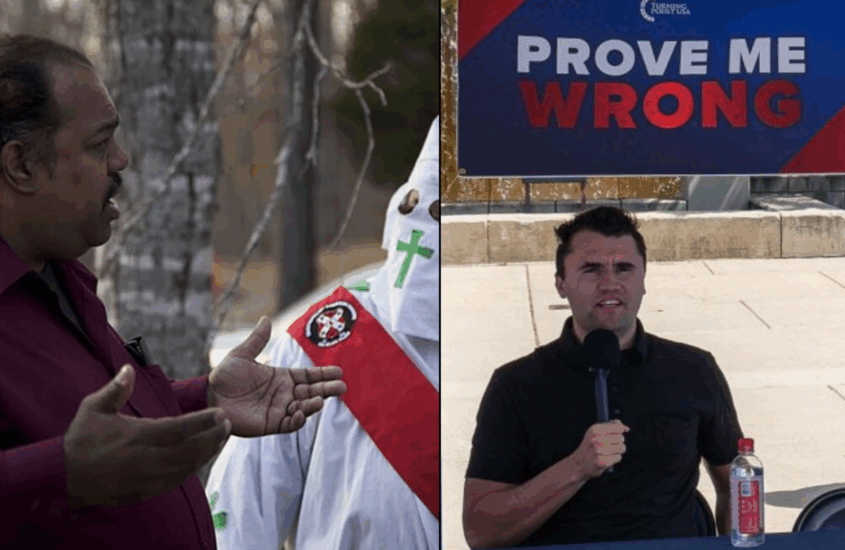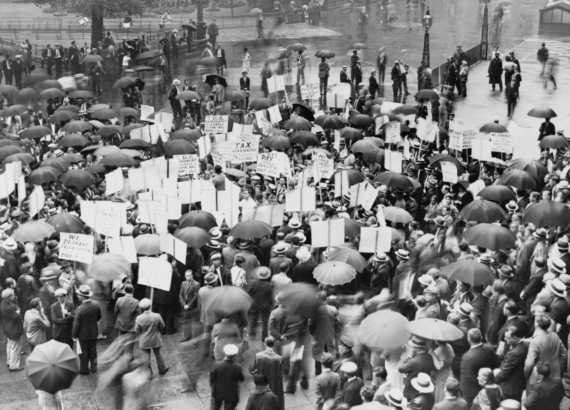The Moral Audacity of Daryl Davis and Charlie Kirk
AmericanMom Team |
Courage doesn’t always wear the same face.
Sometimes courage is a man walking into a debate hall armed with conviction and ready to defend his ideas before a hostile crowd. And other times it’s a Black man walking into a living room filled with Ku Klux Klan members, armed only with questions and the belief that hearts can change.
Charlie Kirk and Daryl Davis couldn’t be more different in ideology, tone, or background. Yet both men set an example of rare moral audacity — a willingness to go where they are reviled, to engage those who opposed them, and to do so not out of spectacle but in the pursuit of truth.
Moral Audacity: Into the Lion’s Den
For Charlie Kirk, the lion’s den was the American university campus. Putting to the test the idea that college is designed to be a feast of ideas, where diversity of thought flourishes, he set up tables under tents that read “Prove Me Wrong.” He invited students, professors, and critics alike to a debate. He gave them a space to voice their opinions—in favor of or opposition to his own—allowing them to challenge his ideas on faith, government, and freedom. Often, the colleges failed the test, proving that they were cranking out citizens who cared nothing for diversity of thought or open discussion. But he never hid from the onslaught of conflict. Time and again he went straight to the center of it. He literally gave his life for this purpose and cause.
For Daryl Davis, the lion’s den was far darker. A Black jazz musician, Davis spent decades doing something seemingly impossible: befriending members of the Ku Klux Klan. He sat in diners, hotel rooms, and homes with people who believed his very existence was inferior. And yet, through patient dialogue and relentless curiosity, Davis persuaded over 200 men to abandon the Klan and renounce hate. To this day, he counts these men as friends. Time and again, he proved that an exchange of ideas, words, simple knowing, is far stronger than fear and hatred.
The lion’s den—a punishment of the cruelest kind in the Bible—became the battlefield for these men. But they entered knowing truth was on their side, they sat among the lions themselves in peace, proving the power of their convictions was bolstered by a higher Power.
Different Methods, Same Courage
Charlie Kirk’s arena was confrontation built from sharp exchanges, rapid logic, and the challenge of public scrutiny. His debates were often fiery, but his aim was always persuasion through truth. He believed the moral duty of Western civilizations and citizens is to defend Western values, stand firm against cultural drift, and unapologetically refute lies.
Daryl Davis’s work was quieter; his courage lay in proximity. He practiced radical listening, sitting inches away from men who wore hoods of hate. He listened before he challenged. He didn’t compromise his beliefs. He simply knew persuasion would come through relationships, not words alone.
Both Davis and Kirk risked something profound: reputation, safety, even life. But both chose principle over comfort. Kirk met endless hostility with a resolve to appear and speak in spite of a culture that punishes conviction. Davis entered rooms where his skin color alone could have ended his life. But he believed that if hate could be learned, it could be unlearned.
Despite warnings, backlash, threats, and criticism, both men believed there was no working by halves if the world was going to change for the better.
Legacies of Conviction
Movements, bridges, connection, community, and a stronger America have been built thanks to these men and their unflappable convictions. Both chose to believe in something real and bigger than themselves, both decided to be the face of that belief, even if they stood alone. But they never did; there was always a crowd cheering them on, even if they were, at times, drowned out by the hostile opposition.
Kirk’s message inspired thousands of young conservatives to stand unashamed for their faith and country. His legacy is not only Turning Point, but his family, and the courage he modeled.
Davis’ conversations turned hate into humanity, transforming enemies into friends. His legacy is transformed lives and renewed hearts; proof that even in the darkest corners of division, light can still enter through understanding.
Lessons for a Divided Nation
The stories of Davis and Kirk converge at a moral crossroads. One shows that transformation begins when we listen deeply. The other reminds us that truth demands we speak boldly. Both point us in the direction we must travel, even if that road is a little overgrown and perilous.
To rebuild our fractured society, we will need courage that is both patience to understand and strength to stand firm. Audacity mixed with humility. Conviction with compassion.
The Den Awaits
The lion’s den awaits all who dare to enter it.
In Matthew 5:15 we are told to put our lamps on a lampstand for all to see. We are called to illumine the world on the public stage, during a quiet conversation at the kitchen table, in front of our enemies (whom we also called to forgive and pray for), and tucked away in the darkest corners of our world.
Every act of moral audacity chips away at fear and falsehood. Our light grows stronger. Charlie Kirk and Daryl Davis remind us that courage wears many faces, but it never stands silent by the wayside.
Their legacies prove that it isn’t necessary we all agree, but it is vital we all care enough to engage. Truth demands we enter the den with a little audacity.






